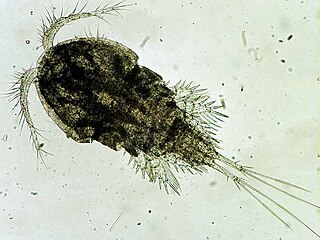
The Cyclopoida are an order of small crustaceans from the subclass Copepoda. Like many other copepods, members of Cyclopoida are small, planktonic animals living both in the sea and in freshwater habitats. They are capable of rapid movement. Their larval development is metamorphic, and the embryos are carried in paired or single sacs attached to first abdominal somite.
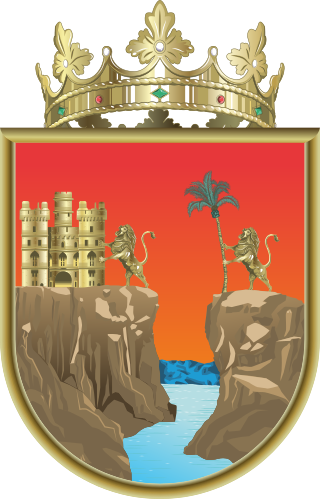
The governor of Chiapas is the chief executive of the Mexican state of Chiapas. The state constitution stipulates a term of 6 years, to which governors can only be elected once. It also specifies the qualifications for becoming governor: a Mexican citizen by birth, aged at least 30 years old, and having not less than 5 years residency in Chiapas. The current governor is Rutilio Escandón from the MRN, who assumed the position in 2018.

Canthocamptidae is a family of copepods. Most of the 700 species are confined to fresh water, although there are also marine species. It contains the following genera:

Ectinosomatidae is a family of the Harpacticoida, a huge group of crustaceans belonging to the subclass Copepoda. Like most of their relatives, they are usually benthic inhabitants of marine environments. Ectinosomatidae commonly inhabit sediment and fragments of dead corals or glass sponges, and occasionally algae and bryozoans, in the deep oceans. In the epifaunal species, the first leg pair is often modified to allow the animals a better grip on the substrate.
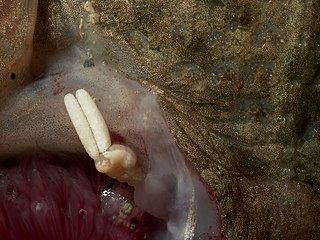
Chondracanthidae is a family of parasitic copepods, usually found infecting the branchial chamber of demersal fishes. It comprises the following genera:
The Chitonophilidae are a family of parasitic copepods, with these genera:
Herpyllobiidae is a family of cyclopoid copepods in the order Cyclopoida. There are about 6 genera and more than 20 described species in Herpyllobiidae.
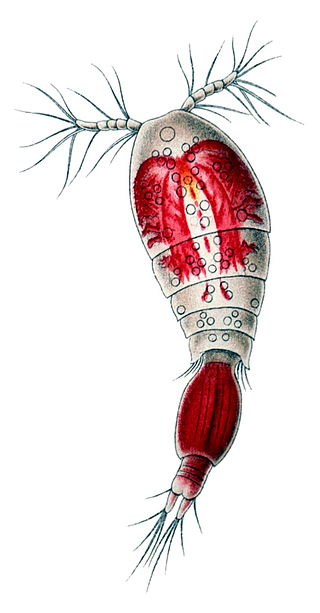
Oncaea is a genus of copepods. The genus contains bioluminescent species. Unlike other bioluminescent copepods, Oncaea have an internal (non-secreted) bioluminescence. Oncaea contains the following species:
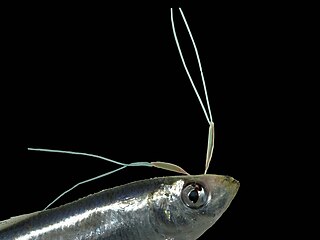
Pennellidae is a family of parasitic copepods. When anchored on a host, they have a portion of the body on the outside of the host, whereas the remaining anterior part of the parasite is hidden inside tissues of the host.
Phaennidae is a family of planktonic copepods, found in pelagic or benthopelagic waters. It contains the following genera:
Robertgurneya is a genus of copepods, containing the following species:

Platycopiidae is a family of copepods. Until the description of Nanocopia in 1988, it contained the single genus Platycopia. It now contains four genera, three of which are monotypic; the exception is Platycopia, with 8 species.
Speleophriidae is a family of copepods, comprising seven genera. All are restricted to anchialine caves, with the exception of Archimisophria, which is found in the hyperbenthos of the depths of the Atlantic Ocean. The genera are:

Euaugaptilus is a genus of copepods. The genus contains bioluminescent species.

The clade Multicrustacea constitutes the largest superclass of crustaceans, containing approximately four-fifths of all described crustacean species, including crabs, lobsters, crayfish, shrimp, krill, prawns, woodlice, barnacles, copepods, amphipods, mantis shrimp and others. The largest branch of multicrustacea is the class Malacostraca.
Oithona is a planktonic crustacean genus found in marine, brackish, fresh water environments. Oithona has been described as the most ubiquitous and abundant copepod in the world's oceans. It was first described by Baird in 1843 using the species Oithona plumifera as taxon type.
Laophontidae is a family of copepods belonging to the order Harpacticoida.
Aetideidae is a family of copepods belonging to the order Calanoida.
Canuellidae is a family of copepods belonging to the order Polyarthra.

Misophriidae is a family of copepods belonging to the order Misophrioida.










